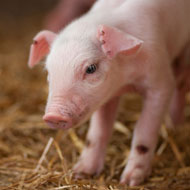RUMA criticises “divisive” fundraising campaign

“Denigrating certain farming systems is likely to alienate and demotivate the vast number of first-rate conventional farmers across the UK..."
RUMA chairman Gwyn Jones has raised concerns about a “divisive” new fundraising campaign by the Soil Association, warning that it could hinder progress being made in reducing antibiotic use in UK farming.
The Soil Association is calling for farm antibiotic use to be significantly reduced through ‘kinder farming methods’. It is asking for donations to fund its campaign work, including bringing farmers to a round-table discussion, meeting supermarket buyers and briefing MPs and SMPs.
On its campaign page it said: ‘The crisis of antibiotic resistance is a crucial moment to press for radical improvements in animal welfare, because it will place unprecedented political pressure on farmers and industry to change farming systems where pigs and poultry are kept indoors, in huge groups, without access to the sun, grass, soil and natural diets.’
However, Mr Jones criticised the group for using the issue of antibiotic resistance to promote philosophical, commercial or fundraising objectives.
“Attacking farming systems under the guise of campaigning to reduce antibiotics could lead to unintended consequences, such as the replacement of high quality and safe British food with cheaper imports,” he warned.
The Soil Association stated that organically farmed animals ’lead healthy lives, rarely get sick, and hardly need treating with antibiotics’. Under organic standards, piglets stay with the mother for at least 40 days and are never given routine antibiotics when they are weaned, the campaign group added, whereas for most industrial pig farms ‘routine treatment with antibiotics is usually unavoidable’.
Mr Jones warned that the “divisive” nature of the claims could alienate farmers.
“Denigrating certain farming systems is likely to alienate and demotivate the vast number of first-rate conventional farmers across the UK who are already implementing change in order to play their part in tackling this global issue. It’s probably not an approach many of our excellent organic farmers will feel entirely comfortable with either.
“Furthermore, antibiotic resistance is a One Health issue across human and animal medicine with good progress being made in both; efforts to divide along these lines too, when we should all be working together, are unhelpful.”
Mr Jones praised the UK farming sector for its “remarkable progress and tremendous commitment” to reducing antibiotic use so far. Achievements include a 10 per cent reduction in antibiotic sales to the farming industry in a single year, a 50 per cent reduction in antibiotics prescribed in feed for young pigs and poultry meat companies stopping all use of preventative antibiotics.
RUMA urged the Soil Association to acknowledge where progress is being made and work with the wider agricultural industry on areas of mutual interest.



 The Veterinary Medicines Directorate (VMD) is inviting applications from veterinary students to attend a one-week extramural studies (EMS) placement in July 2026.
The Veterinary Medicines Directorate (VMD) is inviting applications from veterinary students to attend a one-week extramural studies (EMS) placement in July 2026.